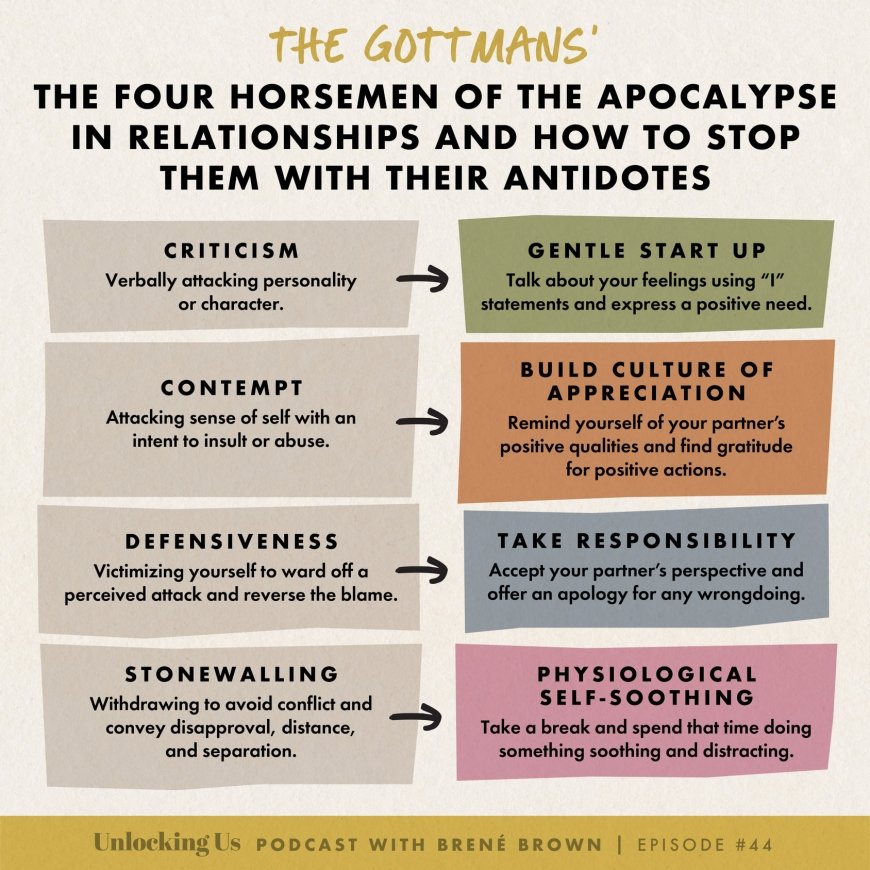Lots of personal struggles, a few therapists, and John Gottman’s science-based book, Seven Principles of Making Marriage Work, is what this text is based on. The title of the article expanded from the concept of marriage to the concept of “relationship”, since most of these principles are applicable not only to marriage, but also to any other relationship, including with a child. So how to build a successful relationship?
The four horsemen of the apocalypse in relationship
At the stage when the relationship is barely breathing, it’s too late to find out what it’s based on and how to build and strengthen it. To begin with, it’s necessary to find out who uses which method of self-defense and to abandon it in order to get to the root of the problem and hear each other. In too abandoned situations, this is often impossible to do without a mediator.
It’s important to understand that in relationships there are no right and wrong, there are only two subjective views on things that must be taken into account and taken seriously.
Psychologist, professor and relationship researcher John Gottman identifies 4 relational “horsemen of the apocalypse”.

- Criticism. This is a subjective accusation of another, which can only cause pain. The fact that constructive criticism doesn’t exist was a discovery for me. At all. Any unsolicited criticism always hurts. The only thing you can do if you don’t like something about another person is to express your feelings and ask them not to do that. Then the person chooses to do it or not, and if not, you have the choice to put up with it or leave if it violates your boundaries or conflicts with your values.
- Contempt. Verbal abuse. All sarcasm goes here, creating a hostile environment and making dialogue impossible. The antidote to criticism and contempt is gratitude and appreciation of the other, concentration on the positive.
- Defense. Pass the buck – here. Relationships are shared responsibility and shared decisions.
- Stonewalling. Ignoring, refusing, closing in on oneself. Most often, it occurs as a natural reaction when a person is simply not able to withstand emotions, verbal flows or the position of another. After all, everything has its limit.

Studies show that a pause of at least 20 minutes helps to overcome the emotional reactions of the “reptile” part of the brain, after which a healthy dialogue from a position of respect gains more chances. If our heart rate exceeds 100 beats per minute (80 for athletes), we simply cannot hear. That’s why some couples wear special wristbands that will give the alarm before it’s too late.
However, some problems are “perpetual” and cannot be solved or compromised, you have to learn to live with them. This is only possible if you follow the seven principles that John Gottman outlined by observing couples’ relationships in the laboratory for years and interviewing them again years later. Gottman learned to quickly determine whether or not a couple would end up breaking up just by observing their reactions a little. If negativity prevails in the air, there is zero chance of survival.
The most common reasons for divorce

The statistics are based on a small study from 2013 (52 divorced couples):
- Lack of commitment (failure to fulfill obligations) is the reason for 75% of divorces
- Communication problems or lack of it
- Infidelity, extramarital affairs (59.6%)
- Family conflicts (57.7%)
- Lack or absence of emotional and (most likely as a result) physical intimacy
- Domestic violence (23.5%)
- Opposite values and morals
- Addictions: alcohol, drugs, gambling, sex (34.6%)
- Money (financial problems or debts) (36.7%)
- Too early marriage age wise (45.1%)
- Incompatibility, lack of common interests
- Serious illnesses or physical incapacity (18.2%)
A 2012 survey asked 886 couples who gave the following reasons for divorce:
- Distance in relationship, lack of physical intimacy (55%)
- Communication problems (53%)
- Differences in money matters (40%)
- Infidelity and personal problems (37%)
- Lack of attention (34%)
- Personal habits (29%)
- Sexual problems (24%)
What is the relationship based on?

And this is actually where good relationships begin – from shared inner comfort, silence and peace. If the storm and triggers are visible from the threshold, you are not on the right path.
When I started couples therapy with the father of my child, I wrote a text for the therapist, in which I expressed everything that did not suit me. The psychologist did not read it. She simply scanned it diagonally, found the word “trigger” and started talking about the “four horsemen of the apocalypse”. By the way, nothing came of the therapy, because none of us could give up our horsemen. Sometimes you just need time, personal therapy, being apart. Sometimes people are so different that nothing will help. Sometimes it happens that we start a relationship with one person and break up with another, because people, their values and needs do not stand still.
A strong relationship stands on common ground. The more you have in common, the more chances you have to accept the differences and get along. And since people are not static, everything needs constant review and discussion.
So, relationships are mutual assistance in meeting each other’s needs. Successful relationships require common interests, goals, and values. And also mutual respect, mutual appreciation, healthy communication and regular attention.
Actually seven principles of John Gottman

Love maps
Knowledge of what your partner lived, lives and plans to live. Understanding their love language, boundaries, needs, accepting them as they are, and loving every part of them.
Nurturing fondness and admiration
That initial affection is obviously given to us for this. It’s important to hold on to the appreciation of everything that we actually fell in love with and not to take it for granted. To rejoice in the positives, and not indulging in the negatives.
Turning toward each other, instead of away
Often, emotions make you want to just turn around and walk away, to distance yourself instead of finding the courage to talk and find a common solution. Every conflict is a chance to become closer or further apart. A relationship is about choosing to experience things together instead of separately.
Allowing each other to influence each other
Another person’s opinion matters and should be taken into account, even if you are 100% sure that you are right. As practice shows, permission to be influenced by another is valuable not only for strengthening the relationship, but also has banal practical value. This is a partnership.
Solving problems that can be solved
Gottman distinguishes two types of marital problems: those that can be solved and those that are “perpetual”. The first type of problem is solved through gentle discussion and compromises.
Overcoming deadlocks
Such problems cannot be solved due to the fact that an unsatisfied need or a deep dream lies behind them. In this case it’s important to understand the root of the problem and learn to live with it. It can be differences in religious views, for example, things that a person is not ready to concede.
Creating shared meanings
A crucial goal of any marriage, therefore, is to create an atmosphere that encourages each person to talk honestly about his or her convictions.
John Gottman “Seven Principles of Making Marriage Work”
Common meanings are a certain fusion of goals, views, tastes of partners, their creation of joint rituals, trips, experiences, small gestures of sensitivity to each other, constant and regular, called to build and maintain closeness and affection for each other.



